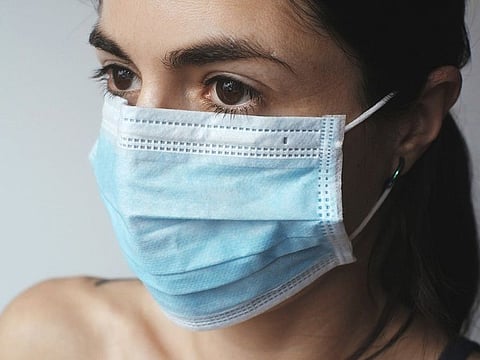COVID-19 precaution in UAE: Can wearing a mask prevent coronavirus infection?
Most people have resorted to wearing surgical masks to combat the spread of coronavirus

Dubai: UAE authorities released a list of fines which would apply to those who violate precautionary restrictions in place to battle the spread of COVID-19.
One of the fines have to do with wearing a mask in enclosed spaces - which specifically applies to people suffering from chronic diseases, and/or people showing cold and flu symptoms. The fine amount for this violation is Dh1,000.
An official confirmed to Gulf News that not everybody is required to wear masks. This is restricted to people who have chronic diseases and are therefore in a high-risk category for infection. People who have cold/flu symptoms such as coughing or sneezing should also wear masks.
What masks?
Two masks are widely being used - a surgical mask and the N95 mask. In all of the directives from the World Health Organisation (WHO) it is reiterated that wearing any mask cannot prevent a coronavirus infection.
A surgical mask is more commonly available and is easily wearable and disposable. WHO says that only people who have the coronavirus infection or are caring for people with COVID-19 need to wear masks as an additional measure of precaution. This, combined with hand-washing and other disinfection procedures, could help in protecting the carer or other people, who live in proximity with the patients, stay safe.
An N95 mask is also a single-use disposable mask. The FDA says: "The 'N95' designation means that when subjected to careful testing, the respirator blocks at least 95 percent of very small (0.3 micron) test particles." Wearing a properly fitted and carefully used N95 mask is more protective than a regular mask - even this one, however, does not prevent illnesses.
Don't use N95 masks
The Ministry of Health and Prevention in the UAE has advised the public not to wear the N95 facial mask as it may cause stress on the respiratory system and lead to future respiratory diseases. Children are categorically prohibited to wear this mask, the Ministry added.
In addition to this, the FDA explains, for people with chronic respiratory, cardiac, or other medical conditions that make breathing difficult the N95 respirator can make it more difficult for the wearer to breathe.
There are some version of this mask available with exhalation valves. Using these valves, however, will not give the user a sterile environment. Surgical N95 Respirators are commonly used in healthcare settings.
So wearing an N95 mask for protection could be detrimental unless you are a health care worker closely working for coronavirus positive patients.
Single-use only
In addition to this, one mask, N95 or regular, is only supposed to be used once as both masks are designed to trap and not deflect. If you use the mask again, or don't follow proper cleansing and sterilisation before and after each use, it could put you at more risk than when you started.
Should I wear a regular mask?
A regular mask, or a surgical mask, is meant to help block large-particle droplets, splashes, sprays, or splatter that may contain germs (viruses and bacteria), keeping it from reaching your mouth and nose.
FDA further explains: "While a surgical mask may be effective in blocking splashes and large-particle droplets, a face mask, by design, does not filter or block very small particles in the air that may be transmitted by coughs, sneezes, or certain medical procedures. Surgical masks also do not provide complete protection from germs and other contaminants because of the loose fit between the surface of the face mask and your face."
The masks could, however, mitigate danger for people who fall in the high-risk category such as those with chronic illnesses or for people who are immuno-compromised. Surgical masks may also help reduce exposure of your saliva and respiratory secretions to others - which is why people with flu or cold symptoms in the UAE have been asked to wear masks in the enclosed spaces.
WHO adds that masks are effective only when used in combination with frequent hand-cleaning with alcohol-based hand rub or soap and water. The way you use the mask determines whether your mask if effective at all.
How to wear a mask - WHO guidelines
If you still want to wear mask, doing the following is essential:
- Before using the mask, clean your hands by washing them or using an alcohol-based hand sanitizer
- Cover mouth and nose and make sure there are no gaps between your face and the mask.
- Avoid touching the mask when using it. If you do touch the mask, clean your hands by washing them or using an alcohol-based hand sanitizer.
- When removing the mask, use the strings to remove and don't touch the front of the mask. Discard it in the trash.
- Wash your hands immediately with soap and water, or use alcohol-based sanitizer.
Don'ts of wearing a mask
- Don't touch the front of the mask during or after use
- Don't use the mask if it has gotten damp
- Don't use the mask more than once
- Don't wear the mask around your neck or pull it to the top of your head
- Don't leave any space between your face and the mask
What about reusable masks?
There has been an uptrend in demand, supply and use of 'reusable' or 'washable' masks, many of which are sponge-based. These masks don't fulfill the requirement for users to dispose of any contaminated material immediately as it requires washing or allows reuse.
The could help in the purposes intended for, i.e. anti-pollution during outdoor activities, but may not provide effective virus protection.







